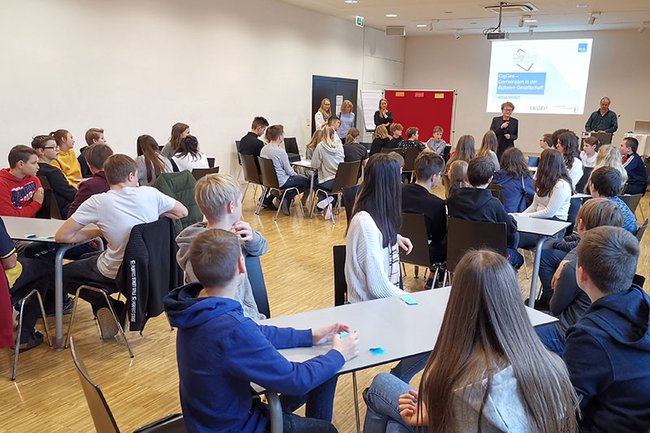Train for the Digital World
Workshops at Schools Impart Knowledge to Young People, Parents and Grandparents

Digitalisation has long been a part of our everyday lives. Children and adolescents always have smartphones or tablets at hand and use them parallel to other activities. This means that people are constantly switching between analogue and digital.
Digitalisation: in all essential areas of life
Within the framework of the project “Gemeinsam in der digitalen Gesellschaft” (together in the digital society), educators and researchers develop digital teaching and learning materials. They also involve teachers, students, parents and grandparents in this process.
“Digitalisation plays a central role in school, in learning and in private life. A distinction between 'only analogue' and 'only digital' no longer makes sense today, we have to think in a more integrative manner”, says Christoph Musik, head of the project and researcher at the Institute of Media Economics at the St. Pölten UAS.
A decade-long process
“Digitalisation has been going on for several decades. It is important to discuss how this process affects our thinking and acting, our everyday life and the possibility to shape social processes.
The perspective should be: how can digital communication, applications and tools be used in a sensible, independent, courageous and responsible manner and which potentials result from this”, says Christian F. Freisleben, university didactics expert at the Service and Competence Center for Innovative Teaching and Learning (SKILL) of the St. Pölten University of Applied Sciences.
Students, teachers, parents, grandparents
One goal of the project is to support students in perceiving and further developing digital skills.
The students and teachers analysed teaching and learning materials dealing with digitalisation that were already available online. These can be found on platforms such as “Rat auf Draht”, “Saferinternet.at”, “Ö1 macht Schule” and “eEducation”.
The students are supposed to slip into the role of “Citizen Scientists” and, as researchers, both analyse and develop suggestions and new elements that can be used in the learning materials. The multimedia products developed in this way will later be presented to parents and grandparents as well as other interested persons.
Promote digital education
“The fundamental cross-sectional topic of the materials to be developed is digitalisation itself: how can we support all actors involved in changes through digitalisation and how can they further develop their own digital literacy in terms of social dimensions," explains Musik.
This includes:
- dealing with your own media biography
- knowledge of creation processes, design principles and aesthetics of media content online and offline
- knowledge about Web 2.0, social media and practical knowledge management: where and how can which content be found and evaluated in terms of information quality.
In addition, the workshops address topics such as:
- political participation with digital tools
- “Safer Internet” content such as virus protection, passwords, dealing with hate speech and cyber bullying
- information about copyright, personal rights and the General Data Protection Regulation
Collaboration will be continued
Next spring, hackathons will take place at the two schools involved in which media technology experts from the St. Pölten University of Applied Sciences will also take part.
Project “Gemeinsam in der digitalen Gesellschaft”
- The project is funded by Innovationsstiftung Bildung/Public Science OeAD GmbH.
- Project partners are the Private Neue Mittelschule Zwettl, the Hertha Firnberg Schulen für Wirtschaft und Tourismus and the association Digitale Bildungsgesellschaft.